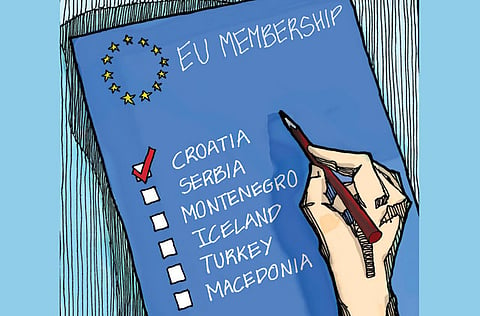EU move east should not be derailed
It should focus on long-term solutions to concerns over euro, joblessness

Public speculation on the possible collapse of the EU continues to gain momentum. The stakes are high since the EU’s ultimate mission goes beyond economic objectives to upholding a form of European Citizenship founded on democratic sovereignty and monetary integration.
As an autonomous alliance of 27 member states, the union aims to create a strong international market and elevate standards of living in Europe by protecting social and civil rights and promoting economic and cultural diversity.
The ‘fifth enlargement’ was a historic milestone for European integration. During this expansion phase, eight central and eastern countries (EU-8) joined the Union in 2004 along with Malta and Cyprus, followed later on by Bulgaria and Romania in 2007 (EU-10).
The accession was intended to broaden Europe’s political and economic reach to increase direct access to western markets and promote efficient communications. The shift of eastern labour to the west has actually been helpful in addressing labour market shortages and boosting operational efficiencies.
The Union’s enlargement has practically expanded the internal market, creating new investment opportunities and attracting fresh investments from different parts of the world. Moreover, with the eastern enlargement, the Union also further extends the area of political stability, particularly within the region occupied by countries that made up the former Yugoslavia and which had been torn by conflict not so long ago.
The public view over the eastern enlargement, however, has been split with respect to emigration. As the older western countries saw great potential in the east’s young workforce, newer members were eager to grab the emerging opportunities to live and work outside their homeland.
Though outward migration has been used as a tool to boost the labour market, increasing post-accession unemployment rates and healthcare system woes in EU-15 – especially in Spain and Italy – aptly illustrate the impact associated with the eastern enlargement.
The Copenhagen criteria aside, there are significant differences among new member states as well as among the older ones that merit closer inspection.
For one, a noticeable gap appears in per-capita income between EU-15 countries and new members when assessing the macroeconomic data from EU members. The disparity can be attributed to the distinct difference in endowments of physical and human capital; that is, the physical and human capital stocks of Central and Eastern European Countries (CEECs) are much lower than the EU average.
The emergence of the European sovereign debt crisis in the wake of the recent financial downturn has added fuel to the fire. Not only did the crisis affect the fragile economies of member CEECs, it also expanded towards the EU-15 markets; Spain and Ireland were especially impacted by the recession.
Contrary to expectations, migrant flows from CEECs continued to increase during the crisis. The result has been a slump in employment rates among nationals.
With Croatia becoming the 28th member of the EU on July 1, and at least five countries, including Turkey, which recently faced some of the country’s biggest anti-government demonstrations in years, eyeing official membership, the Union will have to rethink its strategy to achieve sustainable growth and employment.
And as the Union continues to grapple with the euro debt crisis, which has drained much of its energy, particularly among the “old” member states, efforts for EU enlargement will certainly face much greater challenges.
Nonetheless, considering the long-term advantages of EU enlargement on the economic and political fronts, the Union must remain committed to this ongoing process of expanding its membership.
While the euro crisis has seriously derailed the EU enlargement, this process of inclusion surely remains vital in establishing a much stronger Eurozone and ultimately ensuring long-term peace, stability and prosperity in Europe.
— The writer is the managing director at Orient Planet.



